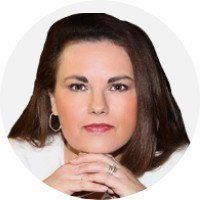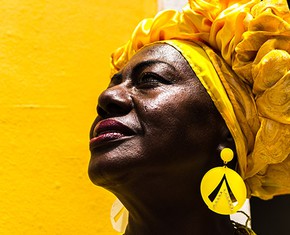The views expressed in our content reflect individual perspectives and do not represent the authoritative views of the Baha'i Faith.
I have a saying that I stole from the movie “Erik the Viking.” It’s “Hy-Brasil is sinking.” If you’ve ever watched the movie, you’ll know what I’m talking about.
There’s an island where blood cannot be shed or the whole island will sink into the ocean. Of course, at some point, a visitor kills someone and the island does indeed begin to sink. But the king and his loyal subjects are in total denial even as they are submerged under the waves. His daughter frantically attempts to get him to see the reality of the situation.
This is, of course, akin to denying climate change. However, I use this saying when things are off-track in a business or on a project and my perception is that there is no hope for it. If I weren’t a Baha’i, I’d probably be saying this now about the world we live in today. Yes, the island of society is sinking. But, what if it’s not? What if it is just a shedding of the old things which we needed to get this far?
The language of negativity will tell you that the world is coming to an end. When a seed is planted and it begins to shed the kernel around it, in negative terms it is falling apart. When it travels up through the soil and the soil begins to erode around it because it can no longer contain it, in negative terms, the world is coming to an end.
Both of these are true. The seed does come apart, and the world it has lived in until that point does indeed come to an end. But if the seed is afraid of anything, it is afraid of not knowing what comes next or how to live in that new world.
Now let’s put it into positive terms: The seed is shedding the kernel so that it may grow. It is evolving, not falling apart. And when the seedling reaches the top of the soil and that soil begins to erode around it, it grows into the new world that it was made for.
So, language has a paradox—something which is simultaneously true and untrue—in that the negative perspective is true, but only to a point. We know this because when the seedling breaks through the topsoil, this is not the end of its life, or its world, but merely the end of the existence it has known up until this point.
Would it surprise you to know that, despite my anger at collective and individual injustices in the world today, I staunchly believe that we are headed towards a future of peace and harmony? My only woe is that I am not doing everything in my power to bring about that future, and most of all, to be deserving of living in it.
All of this connects to the language that I use to communicate every single day. This language has gotten me this far in life and in business—by telling people the cold, hard truth even when they didn’t want to hear it. The real problem is that, in the words of Marshall Goldsmith, “What got you here, won’t get you there.” Just because the language of negativity has gotten me this far—and has gotten our society this far—does not mean that it will get us to our destination.
You see, the seed needed that kernel, its outer covering, to protect it until it could be planted. And when it was planted, it needed to shed that covering so that the seedling could grow up through the soil. It also needed the protection offered by the soil as it grew, so that it would not be eaten by birds before it had a chance to grow into a plant. But when it no longer needed the soil to protect its fragile leaves, it burst out of that same soil, to live in the sun.
We need to do the same with our language. Because the language of negativity is not going to get us to a world of peace and harmony. It can’t, because that is not its job, and because it comes from a world that is not at peace.
The language of negativity was simply one perspective. But we have turned it into the cornerstone of everything we believed to be the embodiment of truth and fact. And we have done so in very much the same way that the words those people said to me as a child have become the voices in my head that echo their negative sentiments.
Many years ago, I took Baha’u’llah’s words to heart:
Bring thyself to account each day ere thou art summoned to a reckoning; for death, unheralded, shall come upon thee, and thou shalt be called to account for they deeds. – The Hidden Words, p. 11.
I was so determined to live by these words that I began to keep a journal. Every day, I would write down all of the negative traits that I had exhibited during the day—even the negative thoughts that I’d had. It painted a sad picture of an angry and damaged young woman who probably should not be roaming the streets alone.
Then, one day, I had an epiphany: If my character was like a store, I needed to take stock of everything in it, not just the bad things. So, my journal began to change and I started seeing a better, more complete picture of myself: not as someone angry and broken, but as someone trying her hardest to fight against the soil, to become the flower she knew she was destined to be.
Then I understood a new meaning of this Baha’i teaching:
Be fair in thy judgment, and guarded in thy speech. – Baha’u’llah, Gleanings From the Writings of Baha’u’llah, p. 285.
I realized this means we should strive to be understanding of the situation someone is in and try to use positive language to talk about it. But this does not mean avoiding the conversation altogether while sitting back and trying not think about how deluded the other person is for thinking the way they do.
I am committed and determined to overcome this language barrier—to re-write my internal map so that when I am stressed and uncertain, I can see things for how they really are, and not hear those negative voices in my head. When I say things in a negative way, I will ask myself these things:
- Am I sure this is a bad situation, even though it hurts?
- How am I learning and growing from this situation?
- What is the positive outcome of this?
- If this is the end of the world that I have known up until this point, what comes next?
I invite you to join me on this journey of learning how we can overcome this language barrier, and how we can translate our thoughts and words into the language of positivity.
















Comments
Sign in or create an account
Continue with Googleor